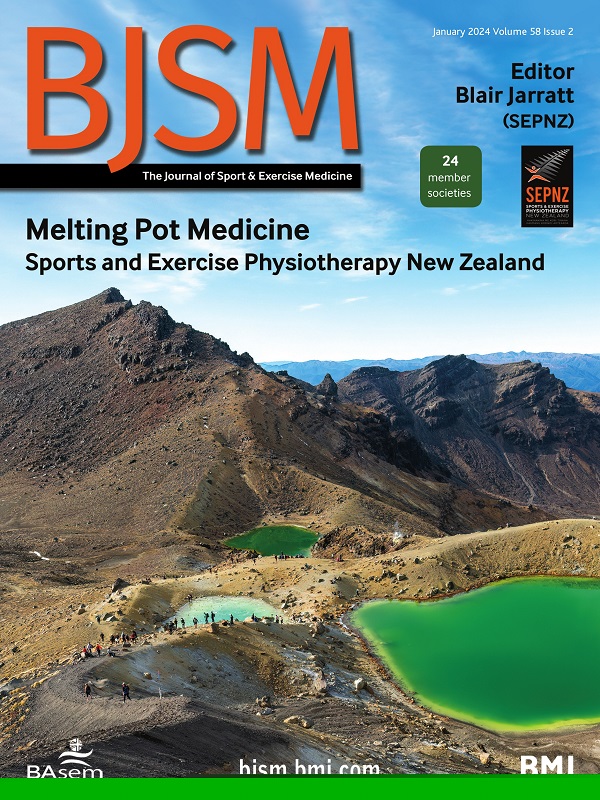Exercise based cardiac rehabilitation for atrial fibrillation: Cochrane systematic review, meta-analysis, meta-regression and trial sequential analysis
IF 16.2
1区 医学
Q1 SPORT SCIENCES
引用次数: 0
Abstract
Objective To undertake a contemporary review of the impact of exercise based cardiac rehabilitation (ExCR) for patients with atrial fibrillation (AF). Data sources CENTRAL, MEDLINE, Embase, PsycINFO, CINAHL, WoS Core Collection, LILACS and trial registers were searched from inception up to 24 March 2024. Eligibility criteria Randomised clinical trials (RCTs) comparing ExCR with any non-exercise control. Design Random effect meta-analyses presented as effect estimates and 95% CIs. Meta-regression examined study level effect modification. Cochrane risk of bias, GRADE (Grading of Recommendations Assessment, Development and Evaluation) and trial sequential analysis (RTSA) were applied. Results 20 RCTs (n=2039) with a mean follow-up of 11 months showed that ExCR did not impact all cause mortality (8.3% vs 6.0%, relative risk (RR) 1.06, 95% CI 0.76 to 1.48) or serious adverse events (2.9% vs 4.1%, RR 1.30, 95% CI 0.66 to 2.56) but did reduce AF symptom severity (mean difference (MD) −1.61, 95% CI −3.06 to −0.16), AF burden (MD −1.61, 95% CI −2.76 to −0.45), episode frequency (MD −0.57, 95% CI −1.07 to −0.07), episode duration (MD −0.58, 95% CI −1.14 to −0.03), AF recurrence (RR 0.68, 95% CI 0.53 to 0.89), and improved exercise capacity (maximal oxygen consumption (VO2 peak) MD 3.18, 95% CI 1.05 to 5.31 mL/kg/min). There was benefit for the mental component but not the physical component of a health related quality of life questionnaire. No differential effects across AF subtype, ExCR dose, or mode of delivery were seen. Conclusion Meta-analyses of RCT evidence for ExCR in patients with AF demonstrated several clinical benefits without an increase in serious adverse events. GRADE and RTSA assessments indicated further high quality and adequately powered RCTs are needed. Data sharing not applicable as no datasets generated and/or analysed for this study. Meta-analysis of aggregate data.以运动为基础的心脏康复治疗心房颤动:Cochrane系统评价、meta分析、meta回归和试验序贯分析
目的探讨以运动为基础的心脏康复(ExCR)对房颤(AF)患者的影响。检索数据源为CENTRAL, MEDLINE, Embase, PsycINFO, CINAHL, WoS Core Collection, LILACS和trial registers,检索时间从成立到2024年3月24日。随机临床试验(RCTs)比较ExCR和任何非运动对照。随机效应荟萃分析以效应估计和95% ci表示。meta回归检验了研究水平效应的修正。应用Cochrane偏倚风险、GRADE(分级推荐评估、发展和评价)和试验序列分析(RTSA)。结果20相关(n = 2039),平均11个月的随访表明,ExCR没有影响所有原因的死亡率(8.3% vs 6.0%,相对危险度(RR) 1.06, 95%可信区间0.76到1.48)或严重不良事件(2.9% vs 4.1%,相对危险度1.30,95%可信区间0.66到2.56)但并减少房颤症状严重程度(平均差(MD)−1.61,95% CI 3.06−−0.16),房颤负担(MD−1.61,95% CI 2.76−−0.45),集频率(MD−0.57,95% CI 1.07−−0.07),事件持续时间(MD−0.58,95% CI 1.14−−0.03),AF复发(RR 0.68, 95% CI 0.53 ~ 0.89)和运动能力改善(最大耗氧量(VO2峰值)MD 3.18, 95% CI 1.05 ~ 5.31 mL/kg/min)。与健康相关的生活质量问卷的心理部分有好处,但身体部分没有好处。没有观察到AF亚型、ExCR剂量或递送方式的差异效应。结论:对房颤患者使用ExCR的RCT证据进行荟萃分析显示,在不增加严重不良事件的情况下,ExCR有多项临床益处。GRADE和RTSA评估表明需要进一步的高质量和足够动力的rct。数据共享不适用,因为没有为本研究生成和/或分析数据集。汇总数据的荟萃分析。
本文章由计算机程序翻译,如有差异,请以英文原文为准。
求助全文
约1分钟内获得全文
求助全文
来源期刊
CiteScore
27.10
自引率
4.90%
发文量
217
审稿时长
3-8 weeks
期刊介绍:
The British Journal of Sports Medicine (BJSM) is a dynamic platform that presents groundbreaking research, thought-provoking reviews, and meaningful discussions on sport and exercise medicine. Our focus encompasses various clinically-relevant aspects such as physiotherapy, physical therapy, and rehabilitation. With an aim to foster innovation, education, and knowledge translation, we strive to bridge the gap between research and practical implementation in the field. Our multi-media approach, including web, print, video, and audio resources, along with our active presence on social media, connects a global community of healthcare professionals dedicated to treating active individuals.

 求助内容:
求助内容: 应助结果提醒方式:
应助结果提醒方式:


